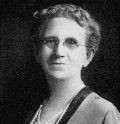While the dinner was in progress, Grandma could not help noting the Carbon traits in her children. All had seen the hard side of life and as each related her story to the sympathetic listeners, Grandma observed and made her comparisons. In each of her guests, she recognized some characteristic of herself or of her sister, Carbo animalis, but in a greater or less degree of development. Their absent-mindedness reminded her of her own periodical want of memory. In their mental sluggishness, she saw her own feeble memory and slow flow of ideas. Their anxiety and tears recalled the time when, her own anxiety was so great as to cause her to tremble all over and weep.
Timid Baryta reminded her of her own bashful childhood and she recalled the time when she too was easily frightened. She smiled now at her former nightly fear of ghosts. The little self-willed calc. children reminded her of the days when in a fit of temper, she used to strike, kick and bite to express her rage. The Amm-carbs. nose-bleed had been an inheritance from the Carbon side of the house; there was the thin, dark blood so familiar to Grandma, but the Ammonium’s epistaxis was produced more easily than her own. She could not remembered the time when hers had been brought on by simply washing the face. Amm-carb. was the most hemorrhagic of all her children, though most of them suffered from hemorrhages to a certain extent. Baryta carb’s. nose bleed was likely to be attended by catarrh in the post nares, and it was quite likely to come before the menstrual period. The Calc-carb’s nose bleed was more likely to come from the right nostril. It was just as frequent and profuse as Grandma’s, but it was likely to came in the morning, while Grandma’s usually came at night, though at times it came in the fore-noon, and it was followed by fainting or pain in the chest. Amm-carb’s. came in the morning and usually from the right nostril, though the left nostril sometimes bleeds. Most of Amm-carb’s. troubles come on the right side. Lith-carb. was full of sympathy for Amm-carb’s. troubles, because her own came on the right side also. Kali carb. like Amm-carb. suffered from nose-bleed on washing the face in the morning. Calc-carb’s nose bleeds from the right side and Stront-carb. was suffering from the chronic effects of hemorrhage.
Calc-carb. had trouble with her children. In spite of their good appetites and fat bodies, they were not healthy. Their teeth were slow and difficult in coming, and their fontanelles did not close early. She had to brace their little bow legs and backs to make them straight. She could keep no decent bedding in the house for they would wet the bed every night, though when she woke them up in very early sleep, she sometimes prevented it, that is if she woke them up soon enough, but after all it did not do much good for they perspire so profusely, that by morning the bed was about as wet as though they had urinated!.
The glands of the neck became enormously large. One of her children had hip- joint disease, another white swelling, while several had died of marasmus. Mrs. Calc-carb. received much sympathy from her sisters who had endured similar experiences. Amm-carb’s children were also scrofulous, though these glands did not enlarge to the extent of those of the Calc-carb children. They too had profuse night-sweats, and involuntary urination during sleep. Their urine was pale with red sediment. Mrs. Amm-carb. had great dread of scarlet fever, her children were of such hemorrhagic nature that it usually took the malignant form with them.
Little Baryta carb. was also a scrofulous child. She had enlarged glands of the neck, with fistulous ulcers. Her glandular trouble was the result of scarlet fever. She had an irritation of the bladder, which was worse at night causing her to wet the bed. Little Mag-carb. and Nat-carb. all had the same story of enlarged glands and scrofula. Mag-carb’s children were slow in cutting their teeth; thin involuntary urination came during the day, and they had night sweats which came after 12.00 p.m. until morning. The sweat was oily and difficult to wash off, and was of sour, putrid odor. Nat-carb’s. emaciated pale-faced children had night sweats alternating with dry skin. They too had involuntary urination at night which smelled sour or like horse’s urine and deposited a mucous sediment.
Grandma mused as she listened. Night-sweats, weak bladder, enlarged glands, scrofula, all down through and they inherited it from Carbons. She re-called her own exhausting night-sweats and enlarged and suppurating glands, her own bladder trouble, for she used to wet the bed as much as any of her grandchildren, and as the thought of it all came over her she questioned in her mind, if any one so psoric had the right to marry and bear children, whose inheritance must be that of continued suffering.

